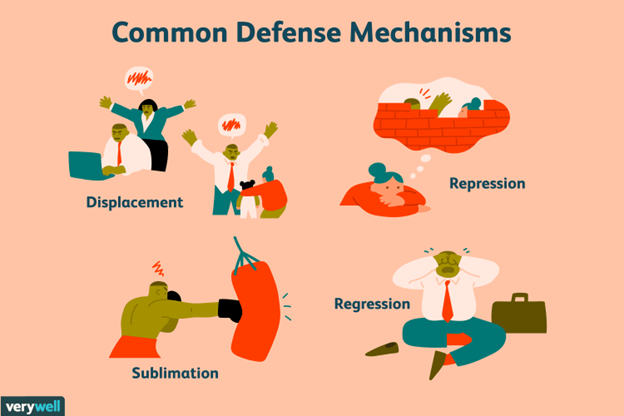A nurse at a mental health clinic is caring for four clients. The nurse should recognize that which of the following clients is using dissociation as a defense mechanism?
A client forgets to buy their partner a birthday gift after a disagreement.
A client who was abused as a child describes the abuse as if it happened to someone else.
A client who is shorter than average is verbally assertive with coworkers.
A client states that they did not get a job promotion because the boss did not like them.
The Correct Answer is B
A. This choice is incorrect because forgetting to buy a gift is not an example of dissociation, but rather a sign of poor memory or lack of attention.
B. This choice is correct because describing the abuse as if it happened to someone else is an example of dissociation, which is a defense mechanism that involves separating oneself from painful or traumatic experiences.
C. This choice is incorrect because being verbally assertive is not an example of dissociation, but rather a personality trait or a coping skill.
D. This choice is incorrect because blaming the boss for not getting a promotion is not an example of dissociation, but rather a sign of external locus of control or rationalization.

Nursing Test Bank
Naxlex Comprehensive Predictor Exams
Related Questions
Correct Answer is A
Explanation
A is correct because it is a direct and respectful way of addressing the issue with the nurse who is violating the unit policies. It also opens up a dialogue for possible solutions and feedback.
B is incorrect because it is a threatening and punitive statement that does not address the root cause of the problem or offer any constructive feedback.
C is incorrect because it is a passive-aggressive and guilt-inducing statement that does not clearly communicate the expectations or consequences of violating the unit policies.
D is incorrect because it is an irrelevant and deflecting statement that does not address the issue of taking an extended amount of time for break.
Correct Answer is {"dropdown-group-1":"A","dropdown-group-2":"B"}
Explanation
A. Postpartum hemorrhage is incorrect because the client has scant lochia rubra and a firm fundus at the umbilicus, which indicate normal uterine involution and bleeding.
B. Seizures is correct because the client has signs of severe preeclampsia, such as headache, blurred vision, nausea, hyperreflexia, and clonus. These are indications of increased intracranial pressure and cerebral edema, which can lead to seizures or eclampsia.
C. Hyperglycemia is incorrect because there is no evidence of diabetes mellitus or gestational diabetes in the client's history or findings.
D. Hypoxemia is incorrect because there is no evidence of respiratory distress or impaired gas exchange in the client's history or findings.
E. Infection is incorrect because the client has no signs of infection, such as fever, malaise, foul-smelling lochia, or elevated WBC count.
Whether you are a student looking to ace your exams or a practicing nurse seeking to enhance your expertise , our nursing education contents will empower you with the confidence and competence to make a difference in the lives of patients and become a respected leader in the healthcare field.
Visit Naxlex, invest in your future and unlock endless possibilities with our unparalleled nursing education contents today
Report Wrong Answer on the Current Question
Do you disagree with the answer? If yes, what is your expected answer? Explain.
Kindly be descriptive with the issue you are facing.
